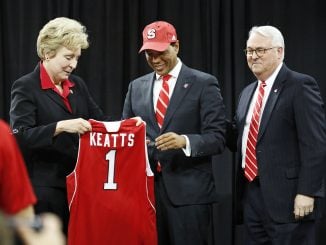
Debbie Yow was one of the lucky ones, although she didn’t realize it at the time.
Growing up in the mid-to-late 1960s, she was able to play basketball for her school teams in Gibsonville because the Guilford County school system sponsored teams for girls. That wasn’t the case only a few miles away at Walter Williams High and other schools governed by the City of Burlington.
“Women’s sports literally did not exist there, so I was blessed,” the retired NC State athletic director said. “I was one of the few that had the opportunity to compete.”
It wasn’t until several years later, on June 23, 1972, that action was finally taken that allowed all young women, regardless of where they lived, the same chance to play.
Known as Title IX, the legislation came in the form of a 37-word clause in the Educational Amendments of 1972 that states “no person in the United States shall, on the basis of sex, be excluded from participation in, be denied the benefits of, or be subjected to discrimination under any education program or activity receiving Federal financial assistance.”
The law does not specifically mention sports. Its broad purpose was to bar sexual discrimination in institutions receiving federal funds and open up opportunities for women in all areas of education.
“Title IX, I believe, is one of the most important pieces of civil rights legislation ever passed in our nation,” Yow said. “It was really at that time more about women having an opportunity to advance in their chosen career field without prejudice.”
Fifty years after his adoption, however, its most significant impact on gender equity remains on the field of competition.
According to statistics compiled by the National Federation of State High School Associations, fewer than 300,000 girls were participating in interscholastic sports at the time Title IX was passed. Today, that number has grown to more than 3.4 million.
More telling is the fact that in the 2021 Summer Olympics in Tokyo, U.S. women accounted for 22 of their country’s 39 gold medals, a total that would have ranked third among all nations participating.
“That success is possible because of what Title IX has produced in our country in terms of opportunities,” said former Wake Forest basketball star Amy Perko, who now serves as the CEO of the influential Knight Commission on Intercollegiate Athletics. “It is rewarding to see.”
As rewarding as that growth has been, it didn’t happen overnight. And it didn’t come without a fight.
Concerned about the potential negative impact Title IX might have on men’s sports, particularly football, a group of legislators tried and failed in multiple attempts to amend or overturn it.
The NCAA, which is not directly impacted by the law, also lobbied hard against it. Instead of sponsoring championships for women, the governing body left it up to a separate organization called the Association for Intercollegiate Athletics for Women.
It took until the 1981-82 school year for the NCAA to finally take over the administration of women’s sports.
Even then, things were still far from equal.
While men’s teams traveled to away games on airplanes, ate at restaurants and stayed at hotels, Yow remembers having to pile into cars with her Elon University teammates and driving themselves, bringing along box lunches from their school’s cafeteria.
For overnight trips, they were issued clean sheets, a pillowcase and checked into vacant dorm rooms.
UNC’s Hall of Fame soccer coach Anson Dorrance recalls that when his storied women’s program was started in 1982, his entire annual budget was $4,500. That’s less than it cost for him to take his Tar Heels to the first national tournament in Colorado Springs — an event he helped organize — the following year.
And because so few schools had teams, especially in the South, he had to fill his early schedules with games against high school girls’ select and club teams.
Dorrance was also the coach of UNC’s men’s program at the time. When the two jobs became too much for one person to handle, he surprised many by choosing the women over the men.
As it turned out, he was one of the first men in intercollegiate athletics to understand the untapped potential of women’s sports.
“I loved so many different aspects of the men’s game, but honestly I picked the women because they were more coachable,” said Dorrance, whose Tar Heels have won an NCAA-record 21 national championships. “I also had a feeling that there was an opportunity for enormous growth in their sport because it checked all the boxes for compliance in that it was very inexpensive and in the number of players on the team. It’s just incredible how our game exploded following Title IX.”
While Title IX was the catalyst for that growth, it was another seminal event involving several of Dorrance’s players that had the greatest impact on finally bringing women’s soccer, and all women’s sports for that matter, into the mainstream.
The U.S. Women’s National Team, led by superstar and UNC graduate Mia Hamm, didn’t just win the 1999 World Cup. By beating China in the final in front of 90,185 spectators at the Rose Bowl and millions of others watching on television, Hamm, Brandi Chastain and their teammates inspired a generation of future athletes while proving that women’s sports can be entertaining, marketable and, most important, profitable.
“Everything we were told we couldn’t do, we did,” Hamm said in April at a symposium in Boston on the impact of the legislation. “We actually put money into women’s sports, and this is what the return is.”
The return isn’t just the number of women playing sports or the opportunities they now have beyond the high school and college level through the success of professional leagues such as the WNBA and National Women’s Soccer League.
It’s also in the growing number of females in coaching and administrative positions, a group that includes Yow, Perko, former Charlotte athletic director Judy Rose and current Duke AD Nina King.
“I’m very appreciative of the time that I came along because I have been given opportunities in areas where female leaders before me just weren’t given that opportunity,” said Perko, a member of the Wake Forest Hall of Fame who in 2001 made history when she was named team president for the Fayetteville Patriots of what is now known as the NBA’s G League. “I feel fortunate and grateful to have been given opportunities by leaders who understood there needed to be more diverse opinions at the leadership table.”



